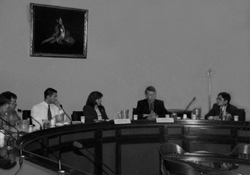Conference ponders the future of E-democracy

Image: Conference ponders the future of E-democracy:Conference participants reflect on the day’s events during the final segment of the 12th Annual Envisioning California conference.:
September 25, 2000
The 12th Envisioning California Conference, entitled “E-Democracy, Education and Initiatives: The Future of the California Republic,” discussed ways of approaching electronic democracy last Thursday at the State Capitol.
The conference, sponsored by the Center for California Studies at Sacramento State, consisted of panels and keynote speakers which brought together experts, elected officials, and corporate representatives.
“I think we will have, in the next 10 to 15 years, undeniable and perhaps unstoppable pressure for e-democracy,” said Timothy Hodson, Executive Director for the University?s Center for California Studies, in a panel discussing legislatures in the electronic future. Hodson sees the trends of increased popularity of direct vote initiatives and increased Silicon Valley involvement in politics as leading toward a form of electronic direct democracy. He points out that Arizona has already had Internet voting in this year?s Democratic Primary.
“Our only choice is not to ask ?how do we stop it [e-democracy]?? because I think that is impossible, but to ask ?how do we shape it??” said Tracy Western, chair of a political Web site, Grassroots.com, and panel member.
Timothy Hodson says that an issue facing this form of democracy is that there may be lack of checks and balances, which could result in a form of majority rule that could infringe on the rights of the voting minority.
“The best system of protecting individual rights is a republic, not a democracy,” Hodson said.
The panel also discussed other potential problems with e-democracy, including the difficulty of the voting populace to vote on the more than 3500 bills that go through the state legislature.
“E-democracy in that case is unworkable,” said California State Senator Ray Haynes, (Republican).
The panel also raised the issue of potential corruption in electronic voting, as well as the effect that it may have on voter turn out.
The Envisioning California Conference also featured keynote speaker Martina Hone, the vice president for Public Policy for PowerUP, a nonprofit organization designed to help young and underprivileged people acquire the skills necessary for the digital age.
Hone feels that one of the problems facing an electronic democracy is the “digital divide” between those who have access to the knowledge and technology and those that do not. Hone said that the digital age will bring the ability to solve many problems but will increase the speed at which people can be left behind.
“California has a lot to lose as a state if it does not deal with the issue of digital divide,” Hone said.
There was also a panel discussing the future of higher education in California moderated by Donald Gerth, president of Sacramento State and featuring David Spence, the executive vice chancellor and chief academic officer of the California State University System. Spence said that the rate of California college students receiving degrees is one of the lowest in the nation.
“We can do more to help students graduate,” Spence said.
Spence also said that there was a need to work cooperatively with high schools and community colleges in order to help students more adequately prepare for the universities. The Conference also featured panels on the redrawing of California congressional districts and the state?s changing demographics.




























































































































